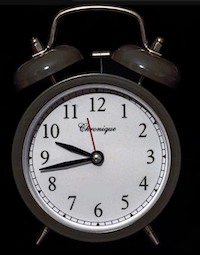After learning some basic numbers, I’m trying to lean how to say what time it is in German with this video.
As explained, the first way to tell the time is for Radio & Fernsehen (radio & television) which uses a 24 hour system.
For example, the time shown on this analogue clock:
(9:43) should be said as either:
- „Es ist neun Uhr dreiundvierzig.“
(“It is nine hour[s] [and] 43 [minutes].”)
or if it’s at night:
- „Es ist einundzwanzig Uhr dreiundvierzig.“
(“It is twenty-one hour[s] [and] 43 [minutes].”)
But when I put this second answer into Google Translate (to check if I’ve got it right), it translates back into English as:
It's 10:43 p.m.
I’m reasonably sure this is a just a mistake, but I’m not sure why Google would have trouble with this seemingly simple phrase.
As the second half of the video explains, telling the time in German can be somewhat complicated, so I thought I’d just check here if I was still misunderstanding something. (Perhaps writing the numbers out in words changes the meaning somehow?)
Am I wrong, or is Google Translate wrong?

